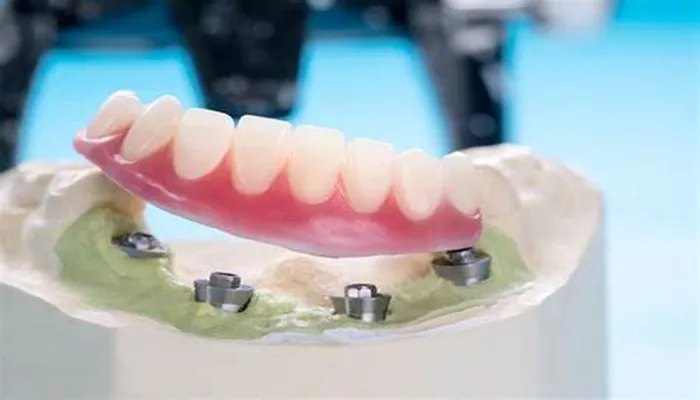Understanding Bone Loss
1. What Is Bone Loss?
Bone loss refers to the reduction in bone density and mass. This condition can occur for various reasons, including aging, hormonal changes, and the loss of teeth. When teeth are lost, the jawbone no longer receives the stimulation it needs to maintain its density. This can lead to a weakening of the bone structure.
2. The Role of Teeth in Bone Health
Natural teeth play a crucial role in maintaining the health of the jawbone.
Stimulation: When we chew, the roots of our teeth stimulate the jawbone. This stimulation encourages the bone to maintain its density.
Bone Remodeling: The process of bone remodeling involves the continuous renewal of bone tissue. Healthy teeth support this process by providing the necessary forces that keep the bone strong.
How Dentures Contribute to Bone Loss
1. Lack of Stimulation
One of the primary reasons dentures lead to bone loss is the lack of stimulation in the jawbone.
Absence of Roots: Unlike natural teeth, dentures do not have roots that extend into the jawbone. This means that the bone does not receive the mechanical stimulation it requires to maintain its density.
Pressure Distribution: When chewing with dentures, the pressure is distributed differently than with natural teeth. This reduced stimulation can lead to bone resorption, where the body breaks down bone tissue and reabsorbs it.
2. Changes in Jaw Structure
Over time, wearing dentures can change the structure of the jaw.
Bone Resorption: The absence of natural teeth leads to bone resorption. This process can cause the jawbone to shrink and change shape, resulting in a less stable foundation for dentures.
Altered Bite: As the jawbone changes, the alignment of the remaining teeth can also shift. This can affect how dentures fit and may lead to further discomfort or instability.
3. Inadequate Fit and Pressure Points
Poorly fitting dentures can exacerbate bone loss.
Pressure Points: If dentures do not fit properly, they can create pressure points on the gums. This can lead to irritation and inflammation, further contributing to bone loss.
Increased Bone Resorption: The uneven pressure from ill-fitting dentures can accelerate the process of bone resorption, leading to more significant bone loss over time.
The Effects of Bone Loss
Bone loss can have several consequences for denture wearers.
1. Changes in Facial Appearance
One of the most noticeable effects of bone loss is the change in facial appearance.
Sunken Cheeks: As the jawbone shrinks, it can cause the cheeks to appear sunken. This can lead to an aged appearance and affect overall facial aesthetics.
Altered Jawline: Bone loss can change the shape of the jawline, leading to a less defined facial structure.
2. Difficulty with Denture Fit
Bone loss can make it increasingly difficult to maintain a proper fit for dentures.
Loose Dentures: As the jawbone shrinks, dentures may become loose and unstable. This can lead to discomfort and difficulty eating or speaking.
Need for Adjustments: Patients may require frequent adjustments or even new dentures to accommodate changes in their jawbone structure.
3. Oral Health Issues
Bone loss can lead to various oral health problems.
Gum Disease: The lack of stimulation from natural teeth can contribute to gum disease. Inflammation and infection of the gums can further complicate oral health.
Increased Risk of Tooth Loss: For those with remaining natural teeth, bone loss can increase the risk of losing those teeth as well.
Preventing Bone Loss with Dentures
While bone loss is a common issue for denture wearers, there are steps that can be taken to minimize its impact.
1. Choose the Right Type of Dentures
Selecting the appropriate type of dentures can help reduce the risk of bone loss.
Implant-Supported Dentures: Unlike traditional dentures, implant-supported dentures are anchored to dental implants that are surgically placed in the jawbone. This provides the necessary stimulation to maintain bone density.
High-Quality Materials: Choosing high-quality dentures that fit well can also help reduce irritation and pressure points.
2. Regular Dental Check-Ups
Regular visits to the dentist are crucial for maintaining oral health.
Monitoring Bone Health: Dentists can monitor the condition of the jawbone and make necessary adjustments to dentures as needed.
Identifying Issues Early: Regular check-ups can help identify potential issues before they become significant problems.
3. Proper Care and Maintenance
Taking care of dentures is essential for long-term success.
Daily Cleaning: Clean dentures daily to prevent the buildup of plaque and bacteria. This helps maintain gum health and reduces the risk of inflammation.
Soaking Overnight: Soaking dentures overnight in a cleaning solution can help keep them clean and prevent them from drying out.
4. Lifestyle Changes
Making certain lifestyle changes can also support bone health.
Balanced Diet: A diet rich in calcium and vitamin D can help maintain bone density. Foods such as dairy products, leafy greens, and fish are excellent sources of these nutrients.
Avoiding Tobacco: Smoking can contribute to bone loss and should be avoided to promote overall oral health.
Conclusion
Bone loss is a significant concern for individuals who wear dentures. The lack of stimulation from natural teeth, changes in jaw structure, and the effects of poorly fitting dentures can all contribute to this issue. However, by understanding the mechanisms behind bone loss and taking proactive steps, denture wearers can mitigate its effects.
Choosing the right type of dentures, maintaining regular dental check-ups, and adopting a healthy lifestyle are all essential strategies for preserving bone health. By prioritizing these factors, individuals can enjoy the benefits of dentures while minimizing the risk of bone loss and its associated complications. If you have concerns about your dentures or bone health, consult with your dentist for personalized advice and treatment options.
Related topics:
- Is There A Permanent Tooth Filling?
- Is There An Over The Counter Tooth Filler?
- How Do I Care for My Partial Dentures?

